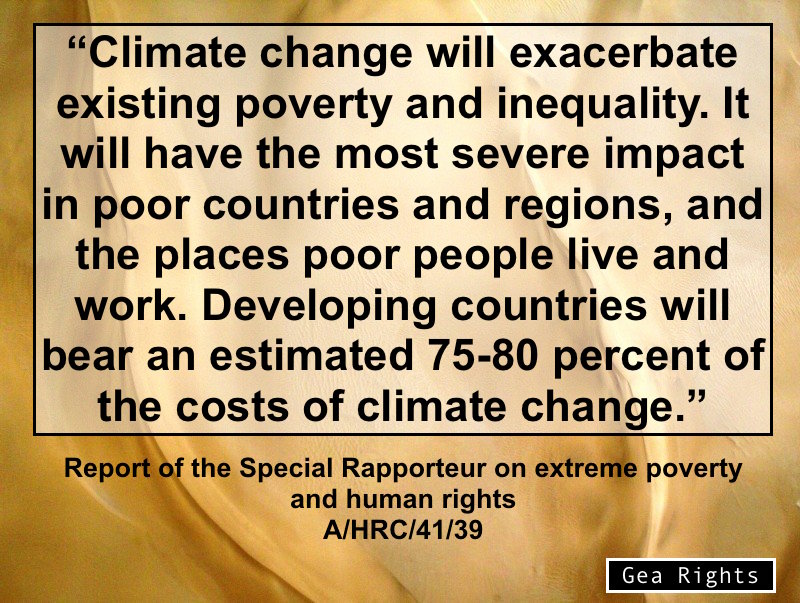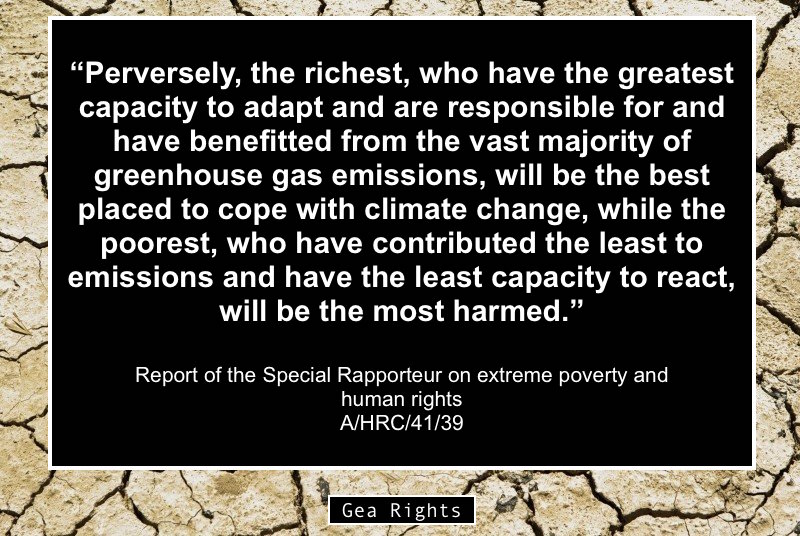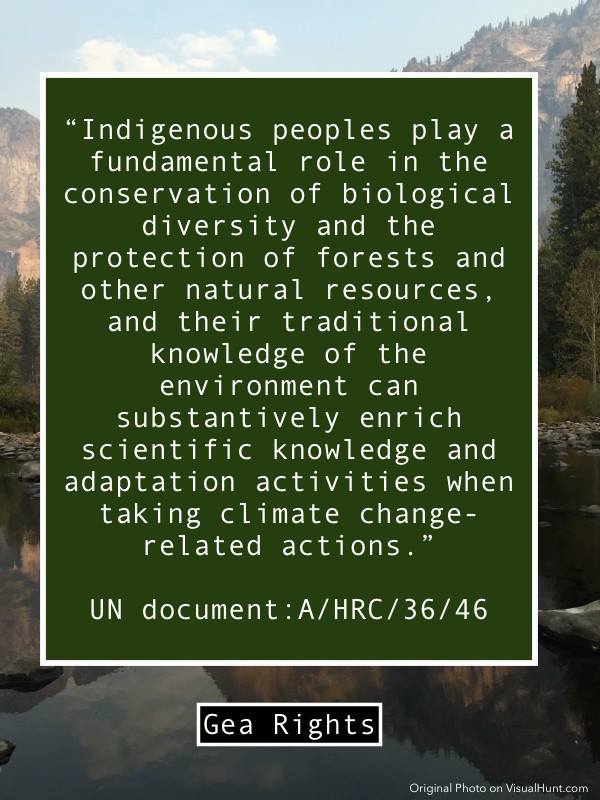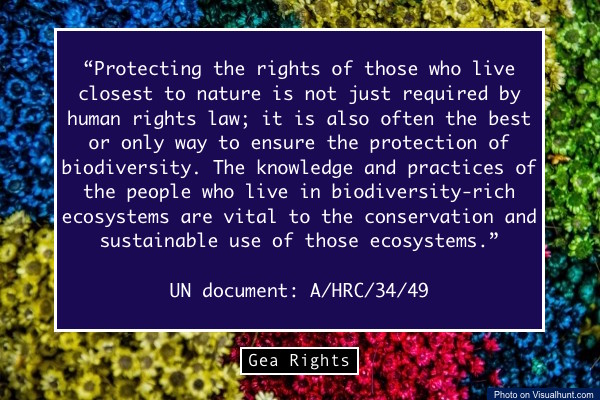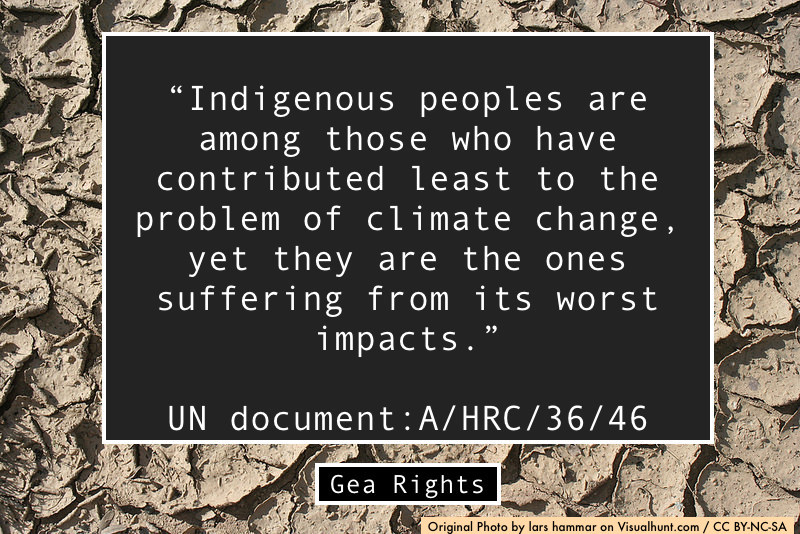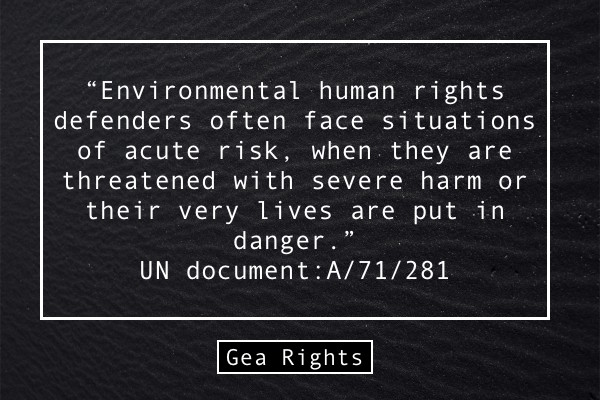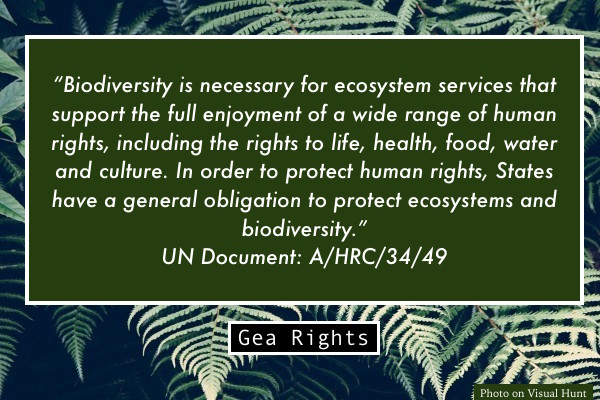According to Chimni:
“the irrational working of capitalism extends to its transactions with nature. The sacred unity between man and nature is subjected to the logic of market, leading to its dysfunctional commodification […] the relationship between the expansion and accumulation of capital and environmental degradation is most often erased. It is therefore not surprising that international environmental law is unable to effectively respond to the ongoing global ecological crisis. The empty concept of sustainable development is coming to be filled with the greed of global capital. In short, capitalism has come to endanger life on planet earth.”[1]
The development of International Law is intimately linked to colonialism, as it shaped its doctrines in relation to occupation, the validity of unequal treaties, the trusteeship system and several colonial practices.[2] The neocolonialism that followed colonialism, marked the second phase of Imperialism, and it was characterized by the exploitation of the countries that had just became independent.[3] The colonial past, in fact, had created economic and political relations that still favored the colonial powers.[4]
Although developing states asserted their sovereignty over natural resources, developed countries affirmed that, according to International Law, they were bound to respect the obligation undertaken by the former colonial States, in accordance to the doctrine of state succession and acquired rights.[5] Former colonies also relied on customary international law to determine compensation in the case of nationalization.[6] As stated in Paragraph 4 of 1962 Resolution 1803 on “Permanent sovereignty over natural resources”, in case of nationalization “the owner shall be paid appropriate compensation, in accordance with the rules in force in the State taking such measures in the exercise of its sovereignty and in accordance with international law.”[7]
According to Anghie, “Third World sovereignty was manufactured by the colonial world to serve its own interests” and perpetuated the legality and validity of “unequal relations” also in the post-colonial era.[8] In this respect, Grovogui argues that decolonization transferred some “rudimentary political powers”, but “did not transform the structures of domination – that is the institutional and cultural contexts of Western hegemony in the global international order”,[9] and perpetuated mechanisms that served the economies of former colonizers.[10] As a result, the attempts and efforts of developing countries to transform international law and to establish a New International Economic Order failed.[11]
As affirmed by Thomas Sankara, murdered president of Burkina Faso, during the famous speech on foreign debt of 29 July 1987 before the Organisation of African Unity:
“We think that debt has to be seen from the perspective of its origins. Debt’s origins come from colonialism’s origins. Those who lend us money are those who colonized us. They are the same ones who used to manage our states and economies. These are the colonizers who indebted Africa through their brothers and cousins, who were the lenders. We had no connections with this debt. Therefore we cannot pay for it.
Debt is neo-colonialism, in which colonizers have transformed themselves into ‘technical assistants.’ We should rather say ‘technical assassins.’ They present us with financing, with financial backers. As if someone’s backing could create development. We have been advised to go to these lenders. We have been offered nice financial arrangements. We have been indebted for 50, 60 years and even longer. That means we have been forced to compromise our people for over 50 years.
Under its current form, controlled and dominated by imperialism, debt is a skillfully managed reconquest of Africa, intended to subjugate its growth and development through foreign rules. Thus, each one of us becomes the financial slave, which is to say a true slave, of those who had been treacherous enough to put money in our countries with obligations for us to repay. We are told to repay, but it is not a moral issue. It is not about this so-called honor of repaying or not.”[15]
Fidler asserts a “return of the standard of civilization” in International Law, and that
“civilizational conquest started under the old SOC [standard of civilization] is now being carried deeper into the hearts of non-Western cultures through international law.” [12]
The international “liberal-inspired rules” promote, among others, the liberalization of trade and foreign investments, the structural adjustment policies endorsed by the financial organizations and the notions of governmental illegitimacy”.[13] The creation of the Bretton Woods Institutions (BWI), the World Bank and the International Monetary Fund (IMF) marked a shift in the civilizing mission of non-Western states, that started using the “neutral and scientific discourse of economics” to justify the intervention of developed countries in the economies of developing countries.[14]
The “Washington consensus”, emerged in the 1989 as a set of 10 neoliberal economic policies for developing countries (initially thought for Latin America), promoting, among others, tax reforms, trade liberalization, privatization and deregulation. [16] These policies, broadly adopted by the main international economic institutions (WTO, World Bank and IMF), promoted in the Third World the globalization that, according to Anghie, meant the “dominance of the neo-liberal economic policies”.[17] The “good governance”, the international institutions, programs and norms aimed at its development, replicate the old “civilizing mission” of the Western countries.[18] A mission that, since Vitoria, has always been inextricably related to trade.[19] The same international economic institutions have implemented the “Washington consensus” set of policies in several countries after war conflicts, such as in Bosnia and Herzegovina[20] or in Iraq.[21]
According to Chimni, nowadays the emerging economies have stopped pursuing anti-imperialist policies and proposing an alternate worldview, enacting on the contrary neoliberal reforms to gain more influence in the international order.[22]The author asserts that the success of capitalism is embedded in its ability to reinvent itself; parallelly, international law has always produced new norms and institutions.[23] He also underlines that:
“The world cannot do without international law in dealing with global problems that confront humanity in the twenty-first century. It is only through the international legal process that problems such as the global ecological crises can be addressed. Yet international law also facilitates the imperial project. The double life of international law thus parallels the double life of capitalism; the latter is also not altogether without achievement.”[24]
International Environmental Law is a fundamental instrument to tackle the ecological crisis. However, in order to be effective, it must be ready to deeply renew its main paradigms. This renovation is strictly related to a process of decolonization leading to an “ecology of knowledge”, as affirmed by de Sousa Santos.[25] Guiding principles, such as “sustainable development” need to be re-discussed, renovated and, where necessary, substituted.
The recognition of the Rights of Nature is the peak of a process started by activists, scholars and politicians for the development an eco-centered jurisprudence, to replace the anthropocentric approach considered one of the causes of the ecological crisis. The Indigenous cosmovision, that has proven to be the cultural substrate of this legal innovation, needs to be considered and included in a dialogic dialogue where all the worldviews are equally valid. The Encyclical Letter “Laudato Si’”[26] and the Synods for the Amazon, on this point, show the growing attention of the Catholic Church towards the environmental crisis, in a perspective of cultural encounter, attesting a process of renovation.[27] A process of dialogue is also taking place within the UN programme Harmony with Nature, but its outcomes do not seem to find place in International Environmental Law and in its main Multilateral Agreements.
However, in order to renovate International Environmental Law, it is important to reconsider the environmental protection in a broader context that includes the overcoming of Capitalism, the economic model that overexploits Nature and that international laws and institutions promote. In fact, where the Rights of Nature were recognized in an the context of an International Law still deeply embedded in a neoliberal perspective of development, in a Western worldview and “civilizing mission”, there is the concrete risk to westernize the underlying concepts, and use them to renew neocolonialism, with developed countries still exercising a control on developing countries’ natural resources. In this regard, the findings of Žižek on the “Western Buddhism” as a way of making Capitalism and its dynamics of exploitation “bearable”, could be a useful starting point to behold, mutatis mutandis, the risks associated to the westernization of the Indigenous cosmovision.[28] The “greening” of Capitalism and corporations needs to be addressed in the same perspective.
So, while the adoption of an eco-centric approach is probably the best way to tackle the environmental crisis, where this view did not succeed to be adopted in the Multilateral Environmental Agreements, International Environmental Law should provide at least a framework in which every State can pursue the protection of natural environment in accordance with its own cultural paradigms. Therefore, where it did not succeed to be become authentically universal, it should renounce to provide cultural references and guiding principles that only reflect the Western paradigms of development. To do so, however, it would be necessary to set some clear and binding limits in terms of carbon emissions or biodiversity exploitation (that do not exist in the present moment) and to ensure their observance. Also, it would be necessary to stop the race towards the “infinite growth” that enhances competition among States, while changing radically our consumption habits.
In the last few years, I have often asked myself whether the protection of ecosystems sited in developing countries, when promoted by Western organizations or governments, equates the perpetuation of a neocolonial control over the natural resources of developing countries, still the richest in biodiversity, especially in the light of the enormous ecological footprint of our consumerist lifestyles.[29] A form of economic compensation for the non-utilization of natural resources aimed at sharing the responsibility of environmental protection, as in the failed Ecuador’s Yasuní ITT intiative[30], could maybe be a balanced way to solve the dilemma, to be discussed along with the States that have sovereignty over those resources in a spirit of cooperation and equality.
Finding a balance between environmental protection and the need to overcome neocolonialism is probably the greatest challenge for any environmental lawyer who wants to protect our wonderful planet, but in doing so, does not want to perpetuate dynamics of dispossession, exclusion and oppression.
References:
[1] Bhupinder S. Chimni, “Capitalism, Imperialism, and International Law in the Twenty-First Century”, in Oregon Review of International Law, n. 14 (2012), pp 22-23
[2] Ibid. p. 27
[3] Ibid.
[4] Antony Anghie, Imperialism, Sovereingty and the Making of International Law, op. cit., p. 208
[5] Ibid. p. 214 ff.
[6] Ibid. p. 218
[7] UNGA Resolution 1803 “Permanent sovereignty over natural resources” (1962)
[8] Antony Anghie, Imperialism, Sovereingty and the Making of International Law, op. cit., p. 215
[9] Siba N’Zatioula Grovogui, Sovereings, Quasi Sovereigns and Africans: Race and Self-Determination in International Law, op. cit., p. 2
[10] Ibid. p. 3
[11] Bhupinder S. Chimni, “Capitalism, Imperialism, and International Law in the Twenty-First Century”, op. cit, p. 28
[12] David P. Fidler “the Return of the Standard of Civilization”, in Chicago Journal of International Law, Vol. 2, No. 1 (2002), p. 147
[13] Ibid. pp-147, 148
[14] Antony Anghie, Imperialism, Sovereignty and the Making of International Law, p. 193. See also Ntina Tzouvala Capitalism as Civilisation – A History of International Law, Cambridge University Press, 2020.
[15] Thomas Sankara, Speech on Foreign Debt at the Organisation of Anfrican Unity, 1987, transcript in English available at https://www.marxists.org/archive/sankara/1987/july/29.htm (accessed 2 June 2020)
[16] John Williamson, “A Short History of the Washington Consensus”, in Law and Business Review of the Americas,
Vol. 15, No. 1 (2009), pp. 7 ff. https://scholar.smu.edu/cgi/viewcontent.cgi?article=1381&context=lbra (accessed 20 June 2020)
[17] Antony Anghie, Imperialism, Sovereingty and the Making of International Law, p. 245
[18] Ibid. p. 249-250
[19] Ibid. p. 251 ff.
[20] See Merim Kasumović “Effects of the Washington Consensus on the Macroeconomic stability of Bosnia and Herzegovina” in ECONOMICS,Vol. 4, No. 2 (published online 18 February 2017) https://content.sciendo.com/view/journals/eoik/4/2/article-p29.xml (accessed 20 June 2020)
[21] See Ntina Tzouvala, “Food for the Global Market: The Neoliberal Reconstruction of Agriculture in Occupied Iraq (2003–2004) and the role of international law” in Global Jurist, Vol. 17, No. 1 (2016); see also Gregory H. Fox, “The Occupation of Iraq” (2004), available at SSRN https://papers.ssrn.com/sol3/papers.cfm?abstract_id=595163 or http://dx.doi.org/10.2139/ssrn.595163 (accessed 20 June 2020)
[22] Bhupinder S. Chimni, “Capitalism, Imperialism, and International Law in the Twenty-First Century”, p. 35
[23] Ibid. p. 37
[24] Ibid. p. 39
[25] Bonaventura de Sousa Santos , Joao Arriscado Nunes, Maria Paula Meneses “Opening UP the Canon of Knowledge and Recognition of Difference” in Another Knowledge is possible – Beyond Northern Epistemologies, (Verso, 2008) available at http://www.boaventuradesousasantos.pt/media/Introduction(3).pdf (accessed 4 June 2020)
[26] Pope Francis, Encyclical Letter Laudato Si’ (24 May 2015) available at http://www.vatican.va/content/francesco/en/encyclicals/documents/papa-francesco_20150524_enciclica-laudato-si.html (accessed 4 June 2020) see, among others, para 68: “Clearly, the Bible has no place for a tyrannical anthropocentrism unconcerned for other creatures.”; or para 146. “In this sense, it is essential to show special care for indigenous communities and their cultural traditions. They are not merely one minority among others, but should be the principal dialogue partners, especially when large projects affecting their land are proposed […]”
[27] Final document of the Synod on the Amazon https://www.vaticannews.va/en/vatican-city/news/2020-02/final-document-synod-amazon.html(accessed 4 June 2020)
[28] Slavoj Zizek, Evento (Italian Edition, UTET, 2014) pos. 800 ff. (digital format)
[29]See http://data.footprintnetwork.org/?_ga=2.225754522.1674620935.1591619373-437998138.1591619373#/ (accessed 4 June 2020)
[30] Juan Falconi Puig, “The world failed Ecuador on its Yasuní initiative” in The Guardian (19 September 2013)
https://www.theguardian.com/global-development/poverty-matters/2013/sep/19/world-failed-ecuador-yasuni-initiative (accessed 4 June 2020)
